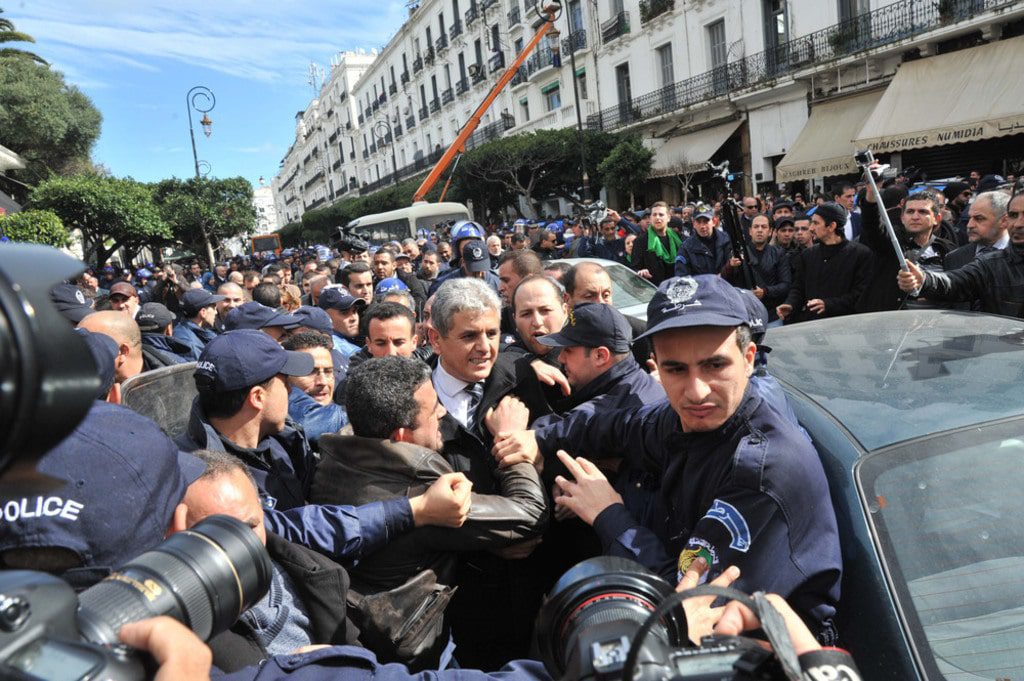
Various indices indicate that Algeria is approaching a new ‘Arab spring’: social and economic unrest is on the rise and the youth is frustrated by the uncertainty of their future. A direct cause of this sudden turn of events is the new 2017 budget.
The Algerian parliament passed its new 2017 budget at the end of November 2016 with the intention to implement it in January 2017. On January 3, 2017, the parliament passed a finance law which, though expected, came as a blow. This new budget came with two sets of measures: to increase the government’s budget in response to the lowering oil prices shock, and to introduce austerity measures. The price of subsidised oil, diesel, electricity, tobacco, and alcohol will rise to fund this increase. Furthermore, goods and fuel will be subject to new taxes, with an important increase of the value-added tax (VAT) from 2% to 19%. Property rentals will also rise 10%.
The reason for these austerity measures lies with the recent decrease in oil prices which hit the country hard. The sudden collapse in the prices of oil and gas has had direct negative effects on the country’s economy. Oil and gas represent about 95% of Algeria’s exports and account for 60% of the state budget. Ranked in the 10th position of gas producing countries and 19th in oil producing countries worldwide according to the U.S. Central Intelligence Agency, Algeria is struggling with the collapse of its economic power and faces a gloomy future on this front. The sudden drop in the production of oil and gas happened between July 2014 and January 2015: during that period the price of these products dropped 55%.
Algeria’s economic climate is not conducive to foreign investment in labour-intensive, competitive companies. The Algerian dinar has lost 40% of its value since 2014. In spite of the government’s tax incentives, the private sector is losing trust in the frail Algerian economy. Even when the oil prices resume growth, Algeria’s troubles will not end: the country’s oil production is down, domestic consumption is on the rise, and the portion reserved for exports has declined, too. Experts estimate that if this continues, Sonatrach, the national oil carrier, would have nothing to export by 2025. Hence the orders from the state summit to accelerate the exploration of natural gas resources. The summit also encouraged looking for Algeria’s shale gas, whose reserves could be greater than those of natural gas. In the past the popularity of the National Liberation front (FLN) helped attenuate severe oil crises such as the economic crash in the mid-1980s, caused by a 50% drop of the price of oil in 1986. But today, the FLN has “much less sway and has even raised scepticism among the rising generations,” as the World Policy Review noted in October 2016.
The austerity measures immediately ignited protests: on January 6, 2017, shopkeepers went on strike in Béjaïa, Bouira and Boumerdès in northern Algeria. The protests started as peaceful but quickly turned violent when tire fires were ignited, shops looted, and many protestors arrested by the police. Other protestors were injured when the police deployed tear gas. The protestors denounced the new finance law as a threat to revenue from sales and to the purchasing power of Algerian households.
The Algerian authorities can no longer control unrest by introducing costly subsidy policies, as it was done in 2011 for flour, milk and sugar. Although the Interior Minister Noureddine Bedoui stated that the situation in Béjaïa is under control, concern is mounting that these protests are the tip of an iceberg and that social unrest will remain a problem until a larger economic and political solution is found.
The Algerian society seems to be on the verge of explosion. Postages denouncing the new austerity measures can be seen everywhere, civic organisations are mounting with warnings against degeneration into more violence and vandalism if solutions are not provided. The 1990s civil war is still in the minds of the people, and they fear a chaos that would only serve the governing forces. These voices also denounce the populist policies of the government which only led to marginalisation and impoverishment.
Socially, Algeria is experiencing severe social problems that affect the youth in the first place. In addition to the high inflation caused by economic problems, the Algerian government declared that one million government jobs may be lost pursuant to the recent oil crash. That represents 40 percent of all government jobs. Inflation and unemployment generate further unemployment, which was officially at 10.5% in September 2016. A quarter of the unemployed is aged between 16 and 24, a very vulnerable group, with the youth unemployment rate almost reaching 30%. The question of how to generate more investment and jobs is not new in Algeria, but it is becoming increasingly more urgent.
Although violence has stopped, protests continue on a daily basis against the government’s oil and gas company Sonatrach and its international partners. Since 2015, protestors have also opposed the government’s project to test for shale gas by hydraulic fracturing near Ain Salah, insouthern Algeria.. These protests have spread to other cities like Algiers and Oran. They were seen as protest against the government’s anti-environment procedures.


